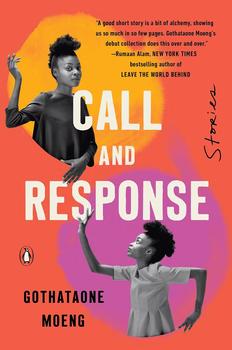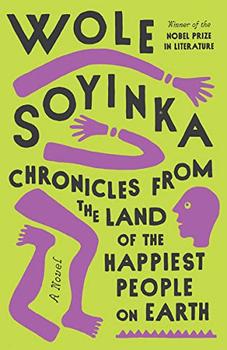Summary | Excerpt | Reviews | Beyond the book | Read-Alikes | Genres & Themes | Author Bio

Stories
by A. Igoni BarrettAward-winning author A. Igoni Barrett's Love Is Power, or Something Like That is without a doubt, a very original, surprising and captivating collection of short stories.
Born in Port Harcourt, Nigeria, in 1979, Barrett draws an enlightened portrait of the current reality of his country. The stories offer an unprejudiced view close to the street, and include references to contemporary elements such as cell phones, the Internet and modern music.
The essence of the book is folded – as in a Chinese fan – in the bold and suggestive title: Love Is Power and more precisely within the second part, Or Something Like That. Traveling with the characters through adventures and mishaps, the reader soon realizes that these are not conventional love stories – and that nobody really knows what love is.
This is apparent because of the clearly unsentimental voices of the different narrators. An artful distance, a dispassionate detachment – not bereft of compassion – permeates the language; and leaves in the reader the bittersweet and amazed sensation similar to the one experienced after reading the tales of Dubliners by James Joyce. There are no happy endings, fulfilling climaxes, or easy morals. There are only remnants of intertwined lives, human landscapes, and cries resounding through dark corridors, as the ones we hear in the story about painful familial love and the solitude of an aging couple, in "Godspeed and Perpetua"; or in "The Worst Thing That Happened," a tale about the unreciprocated love of an old woman for her children.
Many of Igoni Barrett's stories are strikingly searing ones: tales of withering love, of abandonment and oblivion, of mistreatment and injustice, of poverty and power abuse. In some cases, they can be as heart-rending as some of Chekhov's tales (like "The Peasants") or Kenzaburo Oe's ("A Personal Matter"). In other instances, desperation is subtler, and the stories can be read more lightly, even with humor (such as "My Smelling Mouth Problem", the tale of the inner drama of a man whose halitosis prevents him from talking with anybody during his long trips in the crowded city buses; or "Dream Chaser", a story about the thirst for love from a distance).
Thus, in the book, love is not at all an Apollonian, luminous, romantic feeling. It is more like an uncut diamond – to be found within violence, evil, destitution, grief. This is the love of survivors, of those who find in it the hope of last resort amid the shipwreck of their lives.
It is not only in the description of these emotions, or in a realistic recreation of the historical context, where the reader finds the book's main virtue. The most impressive thing about Love Is Power is the writing itself - the almost obsessive attention to detail that, according to Vladimir Nabokov, distinguishes the talented writer from the others.
Interwoven in the fabric of these profound human (sometimes too human) stories, the reader can find a myriad references to trivial objects: colors ("yellow-fever eyes", "goat-shit-green bushes"), noises ("the whirr and screak of the ceiling fan," "the hum of the refrigerator") and smells ("the air stank of old urine," "she gave off the smell of kerosene smoke"). Every room has a particular scent and sound. Every color has a singular nuance or tinge, wrought through a rich use of adjectives: "skin...the color of polished camwood" or "knuckles...the color of healed bruises." Although sometimes too descriptive, these perceptive observations contribute to the the book's rich intensity.
The quality and richness of the writing and the human depth of the stories, makes Love Is Power a very recommendable read, and the author an indisputably promising literary figure who should be closely followed and enjoyed.
![]() This review
first ran in the June 19, 2013
issue of BookBrowse Recommends.
This review
first ran in the June 19, 2013
issue of BookBrowse Recommends.

If you liked Love Is Power, or Something Like That, try these:

by Gothataone Moeng
Published 2024
Richly drawn stories about the lives of ordinary families in contemporary Botswana as they navigate relationships, tradition and caretaking in a rapidly changing world.

Chronicles from the Land of the Happiest People on Earth
by Wole Soyinka
Published 2022
From the first Black winner of the Nobel Prize in Literature and one of our fiercest political activists, a fictional meditation on power and greed - at once a literary hoot, a whodunit, and a scathing indictment of political and social corruption.
The silence between the notes is as important as the notes themselves.
Click Here to find out who said this, as well as discovering other famous literary quotes!
Your guide toexceptional books
BookBrowse seeks out and recommends the best in contemporary fiction and nonfiction—books that not only engage and entertain but also deepen our understanding of ourselves and the world around us.